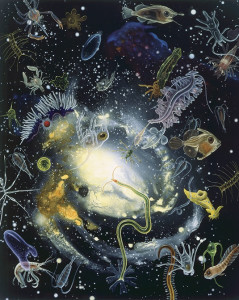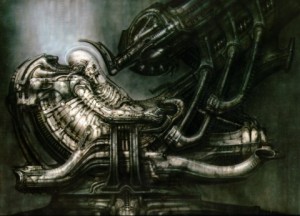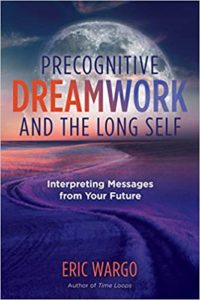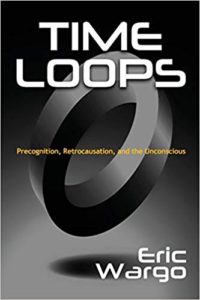The Wyrd of the Early Earth: Cellular Pre-sense in the Primordial Soup
Stand brave, life-liver, bleeding out your days in the river of time.
Stand brave: Time moves both ways …
—Joanna Newsom, “Time, as a Symptom”
The philosopher Alfred Korzybski, who influenced Phil Dick, Frank Herbert, Robert Heinlein, and other science-fictional minds of the mid-20th Century, named “time binding” as a characteristic human activity. He was referring to humans’ ability to plan and pursue goals, including ones of long duration, even transcending the span of an individual’s lifetime. Time binding was implicitly higher than space binding, the activity of animals who live in an eternal present and are dominated by the imperative to forage and hunt for food in their environment, and energy binding, the activity of plants that convert energy from the sun.
The emergence of cells able to bind time would have been a decisive threshold or horizon for the universe. Post-selection created a protective Calvinistic crust on the open-endedness of molecular destiny.
Korzybski was not thinking in terms of precognition, but essentially the argument I have been making in this blog is that we literally bind time through our engagement with the future. Peering into my future-scope, I see post-selection, more than any other new concept, as revolutionizing how we think about time, time-binding, and causality in coming years. Post-selection is the quantum-computing parameter that allows backward-flowing influence from the future to assume a semblance of meaning in the present, but at a cost: a partial but not total “hardening” of causality around pre-sensed events, a narrowing of outcomes available to be exploited precisely in situations where it would improve the organism’s outcomes by some tiny margin. Previously I’ve explored how this affects prophecy and prescience in a human context. I don’t see an expansion of prescience as the next phase in human evolution (Frederic Myers’ “imaginal”); rather, it may have been one of the early thresholds in the evolution of life on earth and throughout the universe.
Physicist Paul Davies speculates that post selection, applied to the vast quantum computer that is the universe, could explain the arising of life:
Perhaps living systems have the property of being post-selective, and thus greatly enhance the probability of the system “discovering” the living state? Indeed, this might even form the basis of a definition of the living state, and would inject an element of “teleology without teleology” into the description of living systems.
I think Davies probably has hit on the correct alternative to more Platonic theories like Rupert Sheldrake’s “morphic resonance” and even syntropy theories that posit future “attractors”—or at least, post-selection is a more productive idiom for describing the in-forming pull of the future. Yakir Aharonov’s work, which provides the quantum-mechanical justification for post-selection, strongly suggests that the entire “randomness” aspect of quantum physics is actually an illusion, that we simply cannot know, except in special circumstances, the future entanglements that dictate a particle’s present behavior.
This is where the distinction between information and meaning becomes crucial: In particles’ present behavior there is information about the future, but we are mostly hamstrung trying to interpret it, that is, make it meaningful. Giving it meaning takes specific experimental setups or entanglement shenanigans in quantum computer circuits such as described by Seth Lloyd, or what is probably going on in the brain. The ability of a molecular quantum computer, such as a microtubule, to “tunnel” through time and thus be, in effect, a little precognitive circuit, could be the key to this. Microtubules do appear to have quantum computing properties; recent findings lend support to this argument originally made in the 1980s by Stuart Hameroff. They could serve as the nervous sytems, sense organs, and brains of cells. Hameroff and Roger Penrose think that quantum coherent behavior centered on microtubules is the basis of consciousness.
 All complex cells, not just neurons, contain microtubules. Lynn Margulis argued that eukaryotes (complex single-celled organisms) formed when simpler prokaryotes (like bacteria) engulfed each other: Mitochondria, etc., were originally independent-living organisms; she argued that microtubules were originally spirochete bacteria that were likewise absorbed. There is some dispute about the latter idea; but regardless of their origin, if microtubules, through quantum entanglement a la Seth Lloyd’s time-travel theory, endow cells with a sensitivity to their future in addition to their present environment, then time-binding might be nearly as basic an activity of complex life as space- and energy binding. Microtubules might have given some cells a decisive edge, enabling them to “preact” in their own interest, conferring a crucial selective advantage.
All complex cells, not just neurons, contain microtubules. Lynn Margulis argued that eukaryotes (complex single-celled organisms) formed when simpler prokaryotes (like bacteria) engulfed each other: Mitochondria, etc., were originally independent-living organisms; she argued that microtubules were originally spirochete bacteria that were likewise absorbed. There is some dispute about the latter idea; but regardless of their origin, if microtubules, through quantum entanglement a la Seth Lloyd’s time-travel theory, endow cells with a sensitivity to their future in addition to their present environment, then time-binding might be nearly as basic an activity of complex life as space- and energy binding. Microtubules might have given some cells a decisive edge, enabling them to “preact” in their own interest, conferring a crucial selective advantage.
What arose at some point in the early Earth, then, was life that both time-binds and space-binds. A eukaryote is a daisy chain of presponsiveness and preactivity to its own near-future. There is now even evidence for microtubule-like structures in earlier prokaryotes as well, meaning that quantum computing might even have been a basic, very early activity of our archaean ancestors. Earth’s primordial soup, in other words, was possibly a precognitive soup.
Simple molecular quantum computers that presponded to the near future (even on the order of microseconds) would be favored in the pre-life margin of organic chemistry. Could tubulin itself, a protein and not anything living as such, be the missing link between (dead) chemistry and biology? Is life, at bottom, a molecular quantum computer’s way of making more molecular quantum computers?
The Bargain
The emergence of cells able to bind time would have been a decisive threshold or horizon for the universe. Prescience—or on the cellular level, “pre-sense”—effectively creates a thin margin of less-alterable future or “predestination” around living things. Because of post-selection, early eukaryotes could have effectively enfolded or nestled themselves in a protective temporal horizon, like a thin causal shell. You might say post-selection effectively created a protective Calvinistic crust on the open-endedness of molecular destiny.
The more an organism feeds its past with useful information, the more constrained its “free will” is. But that sacrifice gives it a marginal survival advantage.
Post-selection is a really good term, because it reminds us of Darwin. An event “survives” when some agent’s prior foreknowledge has not resulted in a deliberate or inadvertent action that forecloses it. In other words, an outcome survives if it does not allow itself to be prevented; it only survives if it is cloaked from past perception or if potentially preventing agents’ perception of it is sufficiently dim and oblique. It calls to mind the idea of ghost universes or bubble realities that have fallen by the wayside, “extinctions” as a result of paradox, incapable of affecting the course of history.
An enhanced ability to see and orient toward certain acceptable outcomes (basically, the outcome of survival, surviving to send information to itself in the past) entails the narrowing of freedom around those outcomes, a diminished ability to defy our fate, our Wyrd. Another way of saying it is that precognition requires traction in the future. Here is an analogy: If an ice-dwelling organism evolved wheels for locomotion, it would have to simultaneously evolve a nozzle on its head that shoots salt out ahead of it so it could move forward; that’s kind of what I mean, but applied to time. Wyrd is the narrowing of our options corresponding to the stretching of the temporal frame of our prescience. The magic frog that lives in my coat and advises me on quantum matters tells me that the trade-off I am describing would correspond to “weak measurement,” the method devised by Aharonov and his collaborators to test his theories about retrocausality.
Even at this early stage, prescience—or pre-sense—needed to orient “positively,” toward reward and “the good.” The actions of these cells oriented toward their own (surviving) future; orienting toward threats would cancel them, and cancel any such precognitive function. This is the implicit Darwinian meaning in post-selection after all: What prevails is what has lived to prevail. We still live with the shadow of this: Prescience is positive, yes-saying, and reward-oriented. It serves as an alarm for threats because some basic cognitive or pre-cognitive function pairs pleasure with destruction and trauma—Freud’s “death drive,” Lacan’s “jouissance,” or Eugene Wegner’s “ironic process.” This is where the ironic Tricksterish aspect of Wyrd comes in: Foresight is purchased at the expense of degrees of freedom.
Or think of it another way: The future, older, bearded you who has survived gives the younger you some information that will only be usable in helping younger you get eventually to where older you is. It doesn’t determine everything about younger you’s actions, and in fact it is so open to multiple and incorrect interpretations that it almost guarantees younger you can’t act differently than to become older you. Younger you will arrive where older you is with a sense of surprise. (Practically everything Slavoj Žižek has ever said about neurosis in relation to the psychoanalytic cure as a “time loop” is contained in that idea.)
 Precognitive beings are in this bind when it comes to free will and predestination. Insofar as their prescience navigates the landscape of time, it is at the expense of a kind of binding to fate, a kind of straightjacketing of Wyrd: Its degrees of freedom are narrowed in order to correctly interpret and utilize—which means, not foreclose—a future situation. The more an organism feeds its past with useful information, the more constrained its “free will” (in the past) is. But that sacrifice gives it a marginal survival advantage over an organism that lacks any preactive capacity, because the sacrifice is not total. (Also the pre-sense of one individual may benefit its kin or community and thus also contribute to its fitness indirectly.)
Precognitive beings are in this bind when it comes to free will and predestination. Insofar as their prescience navigates the landscape of time, it is at the expense of a kind of binding to fate, a kind of straightjacketing of Wyrd: Its degrees of freedom are narrowed in order to correctly interpret and utilize—which means, not foreclose—a future situation. The more an organism feeds its past with useful information, the more constrained its “free will” (in the past) is. But that sacrifice gives it a marginal survival advantage over an organism that lacks any preactive capacity, because the sacrifice is not total. (Also the pre-sense of one individual may benefit its kin or community and thus also contribute to its fitness indirectly.)
Put yourself in the shoes of a slime mold or bacterium. Would you rather have a future version of yourself leaving a breadcrumb trail toward the exact future it inhabits, even if it isn’t the best future and forecloses possibly better other options? Or would you rather gamble that there’s a future at all (i.e., you could be killed at any moment and thus not survive to become older you). Maybe to you, a human being, it sounds like an iffy proposition, since you probably figure your chances of arriving at some future unaided by psi are pretty decent (because even if you believe in psi you still probably think of it, erroneously, as a “significant but small effect”); but it might be a different story if you were a simpler being. That slightly constrained free will is to that organism’s existence in time what its enclosing membrane is to its existence in space: both a container and armor.
The Jouissance of Constraint
In other words, simple life made a deal with its future, that it would accept certain constraints and non-optimal outcomes in order to secure for itself a promise of survival long enough to reach that outcome. We are talking microseconds and milliseconds here, a thin veneer on life’s temporal envelope. But as life complexified, it found ways of prying open or widening this margin by small increments, turning it into more of a shell. Complex cellular assemblages of microtubules (neurons) and nervous systems made of them were a decisive step, enabling those precog circuits to recruit classical-causal interactions in the meat-sphere to “hold” precognitive information associatively for longer and longer periods.
The arising of sentience in a post-selected universe may have introduced a radically different causal regime from what prevailed in the first several billion years post-Big Bang.
A brain such as ours, with trillions of microtubules organized in 86 billion neurons with trillions of synaptic connections, can create the necessary noise of a system within which post-selection and something like “weak measurement” can operate on a much bigger scale. An accurate precognitive signal is a “majority report” within a relatively noisy chatter of relatively inaccurate assessments of the future. It may be this ability to preserve future information in highly oblique, associative form that enables future information to be contained and preserved for a long time—over months and years in some cases—in our “premory.” An unconscious—a tendency to compute across long timespans or even the whole life of the brain—is a necessary entailment of this.
 So is jouissance, which looks out for our survival by binding pleasure to constraint as well as to threat. The best painter of this aspect of jouissance was H.R. Giger, whose “Space Jockey” in Alien is the most perfect icon of endosymbiosis.* When future humans are nothing more than endosymbiotes in machines we created, it may be precisely our precognitive ability, our ability to enter the dreamworld, that makes us indispensable to our engulfing machine progeny. The ability to dream may give the organic brain vast natural advantages over technological precognitive circuits.
So is jouissance, which looks out for our survival by binding pleasure to constraint as well as to threat. The best painter of this aspect of jouissance was H.R. Giger, whose “Space Jockey” in Alien is the most perfect icon of endosymbiosis.* When future humans are nothing more than endosymbiotes in machines we created, it may be precisely our precognitive ability, our ability to enter the dreamworld, that makes us indispensable to our engulfing machine progeny. The ability to dream may give the organic brain vast natural advantages over technological precognitive circuits.
One wonders whether prescience and its necessary tradeoffs could have shaped our regular physical senses as well. There is an old, mostly forgotten theory that vision, for instance, is actually limited by the eye rather than enabled by it—the “clairvoyant theory of perception.” I’m skeptical of clairvoyance as such—I think it is one of the many masks of prescience—but it seems like there could be a grain of truth in this theory anyway: What if the senses emerged in such a way as to constrain or create the needed blind spots to enable prescience (or in the dim oceanic past, our primordial pre-sense) to operate? What if a tradeoff with prescience exerted pressures constraining our ability to navigate space, limiting our degrees of perceptual freedom, just as brains became structures to elaborately limit our cognitive freedom while reaching into the future?
Causal Sclerosis
On the surface, post-selection seems to imply some version of eternalism, the Minkowski glass-block universe I discussed some time ago in the context of Alan Moore’s forthcoming novel Jerusalem, a universe in which the future always already exists, which seems deterministic and claustrophobic—a hoarder’s cosmology (sorry, Alan Moore, you’re a hoarder). Determinism can make deliberate action seem pointless and life bleak. But causality, as I’ve argued (a propos of Moore and Phil Dick) may have a variable viscosity, open/loose/indeterminate in large swathes but given structure by islands of relative inevitability. It could be the case that the only history relatively “locked in stone” (or glass) and thus less subject to alteration by our free will, is precisely those events that are precognized by a sentient agent.
To some higher-dimensional walker on the cosmic beaches, these closed timelike curves created by our quantum brains may be like seashells, discarded remnants of intelligence persisting after their soft fleshy creators are long dead.
It could be that life itself actually injects a kind of novel calcification, stalagmites of determinism, Parmenidean inevitabilities, into the more free-flowing contours of causation, because of this precognitive functioning that dates back to our eukaryote ancestors. The arising of sentience in a post-selected universe may have introduced a radically different causal regime from what prevailed in the first several billion years post-Big Bang. Life opened a window onto its future only by placing itself in a bit of a straightjacket. Viewed four-dimensionally, those time-binding organisms are creating a kind of causal viscosity or solidity around them and in front of them, an ability to “preact” but at the expense of a certain boundedness or limitation on their freedom. That would be paradoxical if it were an all-or-nothing, black-and-white thing, but it isn’t.
We always think clumsily about fate and foresight, in terms of chickens versus eggs. The point is, the chicken and egg arise together, there is no precedence. Thus we cannot say that because we foresee something, causality police will arrive to see that it happens, or that a future becomes locked in and then we can see it, er, beforehand. It is all of a piece, a landscape feature in the four-dimensional topography of spacetime. (In this sense, it is probably ultimately wrong to think about precognition or prescience or pre-sense at all without also accounting for PK phenomena or some kind of gaming of future probabilities. I precognize that PK will be a recurring theme in my speculations during the upcoming year.)
 Beings with precognitive organelles, especially when organized into big brains, actually are shaping the contours of causality and the universe’s unfolding in radically more profound ways, by creating novel acausal formations: those ‘acausal’ (but really, dual causal/retrocausal) feedback loops, which amount to an actual calcification or fossilization of history. (For hermeticists: I wonder whether this Wyrd, this selective hardening of causality around prescient beings, is not precisely the calcification or “styptic” function Rene Schwaller referred to as the function of alchemical salt; it’s just the salt we shoot from our heads to give our psi-wheels traction on the icy mountain road of Time.)
Beings with precognitive organelles, especially when organized into big brains, actually are shaping the contours of causality and the universe’s unfolding in radically more profound ways, by creating novel acausal formations: those ‘acausal’ (but really, dual causal/retrocausal) feedback loops, which amount to an actual calcification or fossilization of history. (For hermeticists: I wonder whether this Wyrd, this selective hardening of causality around prescient beings, is not precisely the calcification or “styptic” function Rene Schwaller referred to as the function of alchemical salt; it’s just the salt we shoot from our heads to give our psi-wheels traction on the icy mountain road of Time.)
To some higher-dimensional walker on the cosmic beaches, these formations, closed timelike curves created by our quantum brains, may be like seashells, the discarded remnants of intelligence persisting after their soft fleshy creators are long dead.
Postscript: Dark Materialism
When all the metaphysical and theological systems have come and gone there remains this inexplicable surd: a flurry of breath in the weeds in the back alley—a hint of motion and color. Nameless, defying analysis or systematizing: it is here and now, lowly, at the rim of perception and being. Who is it? What is it? I don’t know. — Phil Dick, Exegesis
The future intrudes on the present as a void or absence that nevertheless shapes our thought and behavior in subtle ways. Meaning always awaits us in the future, forever deferred and postponed, as French poststructuralists like Lacan and Derrida always insisted. Thus when I argued a few posts back that there is no matrix of meaning giving some kind of secure sense-structure to the universe, I should have been more precise: the universe has no meaning in the present; meaning is always in the future.
Dark matter may be the “missing meaning” of the classical-causal universe, the unconscious of spacetime.
The closest thing to meaning in the present is that perturbation and deflection we feel subtly in our lives. It is Lacan’s Real and Phil Dick’s “surd,” and really, I think, we can place the whole Freudian “unconscious” (and the Buddhist “substrate consciousness”) in the Not Yet as well: It is the place where unthought thoughts are thought. The Not Yet also takes the form of elusive flickering anomalies, maybe even all of the almost-but-not-quite meaningful phenomena that button-down minds dump into the wastebin labeled “the paranormal.” As I suggested in the last post, PK phenomena could even be manifestations of causality’s immune system against paradox. The noönic envelope of the earth, the interpenetration of the future with the present, creates deviations, causal perversions, and anomalies that are both manifestations of “hardened” fate (or Wyrd) and debris of a powerfully time-binding biosphere. It sounds awfully lot like a control system. Are UFOs themselves part of the “long Earth’s” causal immune system?
Unlike many of my friends and fellow anomalists, I’m obviously not done with materialism. Opening physics and psychology up to retrocausality has much more traction as an explanation for psi and other paranormal phenomena (and chaos magic) than waving our hands about consciousness fields and matrices of meaning; it also (to me at least) satisfies the need to restore an excitingly science-fictional richness and surreality to the world made bleak by the dull-minded Dawkinses and other unimaginative science-stops-here skeptics. “Materialism” isn’t the equivalent of that sclerotic, skeptical point of view. It doesn’t mean there’s nothing but matter; for a century, nobody (at least in the hardest of the hard sciences) has believed that. It just means being mentally rigorous, critically minded, and not giving free passes from causality; but it is necessary to radically enlarge our picture of causality, and thus we need a more “elaborative” kind of materialism to replace the reductive one that currently dominates. Mainstream science will get there sooner or later; for now, we anomalists are doing advance scouting of the terrain.
The mystery of dark matter is emblematic of that need to enlarge our picture of matter rather than replace it with some simplistic idealism. A few years ago I speculated that dark matter might be made of knowledge. I was corrected by some readers more knowledgeable in information theory and computing that even very massive ET data collection would not be “big” in mass, because information storage ever tends toward the minute in scale. ET big data would be enfolded in the fabric of space or stored in black holes; it wouldn’t take the form of big Toshiba or Seagate hard drives floating around in space and perturbing the rotation of galaxies. But that throwaway idea was not valueless, because it led me to a better hypothesis, and this one is not idle: Dark matter could really be the perturbing effect of the future, or the Not Yet, at the galactic and intergalactic scale.
In other words, the large-scale perturbation or deviation from our gravitational predictions, which looks (to cosmologists who cannot countenance any future influence) like extra matter shaping the behavior of galaxies, could really be a nonrandom tendency in matter as a result of the causal “pull” of the future. Dark matter might, in other words, be the “missing meaning” of the classical-causal universe, the unconscious of spacetime, and not missing mass as it is presumed to be.
Readers, thoughts?
NOTE:
* Yes, please pretend the dumb prequel, with its moronic reimagining of Space Jockeys as steroid-pumped Woody Harrelson lookalikes, does not exist.



 Didn’t you claimed that meaning is humane creation, produced by and with our semiotics, culture and history, why Universe as such is meaningless? And you seemingly imply that the world is permeated with meaning after all, and this meaning is accessed – or created? – even by microorganisms…
Didn’t you claimed that meaning is humane creation, produced by and with our semiotics, culture and history, why Universe as such is meaningless? And you seemingly imply that the world is permeated with meaning after all, and this meaning is accessed – or created? – even by microorganisms…




This is fascinating and resonates in a number of ways with materials I’ve been wrestling with for a book my husband and I are doing. I’ve shared it on Facebook along with some comments about how it relates to my own interests.